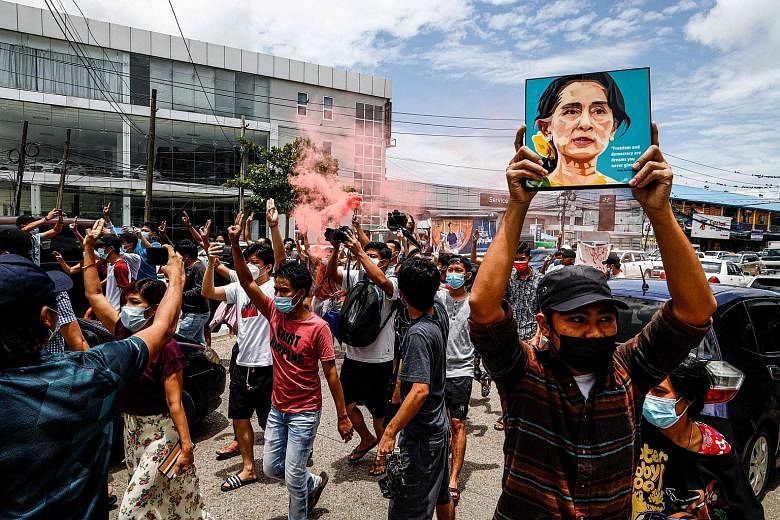NEW YORK • The United Nations General Assembly on Friday sought to ostracise Myanmar's ruling generals with an emphatic rebuke, demanding that they end their four-month-old takeover, stop killing opponents and free imprisoned civilian leaders.
The 193-member body also called for an arms embargo on Myanmar and requested unimpeded humanitarian access to stop the country's slide into poverty, dysfunction and despair.
The adoption of a resolution containing these demands by a vote of 119-1, with 36 abstentions and 37 members not voting, was not the overwhelming consensus its drafters had originally sought.
But it still represented the most widespread condemnation yet of the Myanmar military commanders who seized total control in a Feb 1 coup and have basically ignored all efforts to restore that country's fragile democracy.
"We cannot live in a world where military coups become a norm," UN Secretary-General Antonio Guterres, who was elected to a second five-year term on Friday, said before the passage of the resolution. "It is totally unacceptable."
Mr Olof Skoog, a Swedish diplomat who represents the Delegation of the European Union to the United Nations, praised the outcome. "It sends a strong and powerful message," he said.
"It delegitimises the military junta, condemns its abuse and violence against its own people, and demonstrates its isolation in the eyes of the world."
Historians said it was only the fourth time since the end of the Cold War that the General Assembly had passed a resolution condemning a military coup, and was a rare occasion in which the body also called for an arms embargo.
While General Assembly resolutions are non-binding, the resolution on Myanmar nonetheless was a sharp diplomatic slap of the generals who have acted with impunity.
The yes votes included one from Myanmar's ambassador, Mr Kyaw Moe Tun, who speaks for the country's deposed civilian government and has defied junta orders to resign. The lone no vote was cast by Belarus, which has itself been widely criticised for severe repression of internal dissent.
Perhaps more surprising was the abstention by China, which has extensive investments in Myanmar and has taken subtle steps suggesting that it could accept the junta's legitimacy.
The resolution called on the junta to "end the state of emergency, to respect all human rights of the people of Myanmar and to allow the sustained democratic transition of Myanmar".
It also called for Myanmar's armed forces to "immediately and unconditionally release" civilian leader Aung San Suu Kyi, President Win Myint, and other officials, politicians and "all those who have been arbitrarily detained, charged or arrested".
And in emphasising the need to halt the crackdown on coup opponents, which has left an estimated 870 people dead, the resolution called on "all member states to prevent the flow of arms to Myanmar" - essentially an arms embargo.
The passage of the resolution occurred after the Secretary-General's special envoy for Myanmar Christine Schraner Burgener privately briefed the Security Council on her bleak assessment of what is happening in the country, where a low-level insurrection is defying the military's control and basic government functions have been paralysed or severely disrupted. The junta has barred Ms Burgener from entering Myanmar, but she has extensive contacts there.
"The situation on the ground in Myanmar is very worrisome," she told reporters after her Security Council appearance. "The violations are getting bigger, with violence in regions we've never seen before." She also projected that by next year, absent a humanitarian intervention and other remedial steps, half the country would be living in poverty.
Asean has led the main diplomatic effort to find a way out of the crisis, but was split on Friday over the UN action. Besides Mr Kyaw, Indonesia, Malaysia, Singapore, the Philippines and Vietnam also voted yes, while Brunei, Cambodia, Laos and Thailand abstained.
REUTERS, NYTIMES

